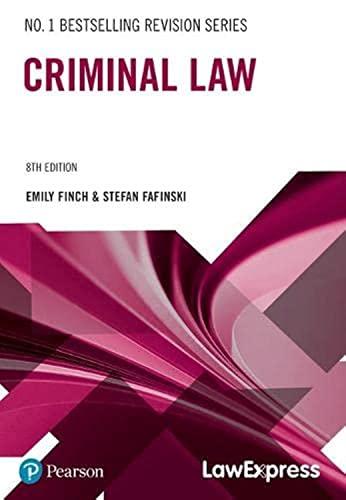Question
For each essay question, state your conclusion, then state the reasons for your conclusion (i.e., the legal issues(s), the definition and/or requirement(s) of the legal
For each essay question, state your conclusion, then state the reasons for your conclusion (i.e., the legal issues(s), the definition and/or requirement(s) of the legal issues(s), and the application of the facts of the question to the legal issues(s)). If you just state a conclusion without giving your reason(s), no credit will be given for that answer. 3. Answers given must show that you found the legal issues presented by the problem; that you know the legal principles to be applied; and that you are familiar with the appropriate legal terms. 4. Before starting to write the answer to each essay question, please take a moment to carefully analyze the facts presented and to organize your thoughts. Remember always: brevity is the soul of with.
Dr. Henry "Indiana" Jones, Jr., a professor of archaeology, has agreed to rent an unfurnished house near the university from Marcus Brody, a museum director. Indiana and Marcus have been friends for a long time, and they don't want to bother with attorneys. They make an oral agreement that the rent will be $12,000 per year payable as $1000 per month due on the first of each month, with the lease term commencing on March 1, 2019 for a term of two (2) years. On March 13, 2020, there was a break in the sewer line serving the premises, which resulted in sewage surfacing from the system. Foul odors filled the home and unhealthy fluids seeped into the basement for long periods of time. Indiana informed Marcus of the leak in an email on March 15, 2020 and followed up on that with several phone calls during the next two weeks. Marcus is well meaning but forgetful, and he failed to hire a repairperson to go fix the leak. After three weeks, Indiana, sick of the lack of meaningful response from Marcus and believing that this was a serious health and safety issue, called the town building inspector as well as the state department of environmental protection. Indiana finally stopped paying rent as of May 1, 2020. On June 15, 2020 (right after the building inspector visited the property and sent a fine to Marcus), the sewer line was finally and completely repaired, and the basement was thoroughly cleaned. That same day, Indiana stated that the home was again perfectly fine to live in. On June 5, 2020, prior to the repairs being made, but right after Marcus received a letter from the town building inspector that a complaint had been received, Marcus gave Indiana written notice to quit the property, effective as of June 30, 2020. Additionally, after Indiana stopped paying rent, Marcus slid an angry note under the front door of the house calling Indiana a "deadbeat," a "terrible archaeologist," and threatening to hire some men to beat up Indiana. Finally, on October 31, 2020, Marcus filed a lawsuit against Indiana to evict him from the house and to collect the unpaid rent from the period of May 1 through October 31. a. Can Indiana make one or more counterclaims to Marcus's lawsuit? If so, what is/are those counterclaims and will it/they be successful? (10 Points) b. Will the court award Marcus the unpaid rent? If so, how much? (5 Points) c. Assuming the repair had been made promptly after Indiana had informed Marcus, and Indiana had never stopped paying rent, based on the June 5, 2020 written notice to vacate, when would the lease have terminated? Please explain your reasoning. (5 Points)
Step by Step Solution
There are 3 Steps involved in it
Step: 1

Get Instant Access to Expert-Tailored Solutions
See step-by-step solutions with expert insights and AI powered tools for academic success
Step: 2

Step: 3

Ace Your Homework with AI
Get the answers you need in no time with our AI-driven, step-by-step assistance
Get Started


